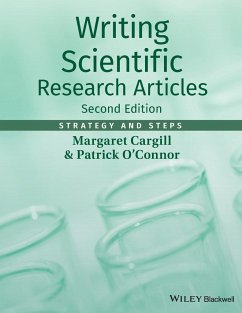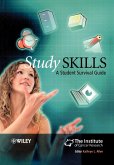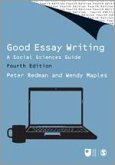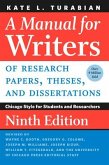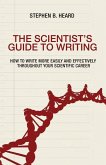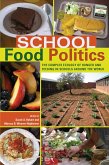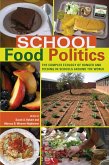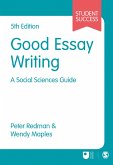- Broschiertes Buch
- Merkliste
- Auf die Merkliste
- Bewerten Bewerten
- Teilen
- Produkt teilen
- Produkterinnerung
- Produkterinnerung
This book shows scientists how to apply their analysis and synthesis skills to overcoming the challenge of how to write, as well as what to write, to maximise their chances of publishing in international scientific journals.
The book uses analysis of the scientific article genre to provide clear processes for writing each section of a manuscript, starting with clear 'story' construction and packaging of results. Each learning step uses practical exercises to develop writing and data presentation skills based on reader analysis of well-written example papers. Strategies are presented for…mehr
Andere Kunden interessierten sich auch für
![Study Skills Study Skills]() Study Skills57,99 €
Study Skills57,99 €![Good Essay Writing Good Essay Writing]() Peter RedmanGood Essay Writing130,99 €
Peter RedmanGood Essay Writing130,99 €![Manual for Writers of Research Papers, Theses, and Dissertations Manual for Writers of Research Papers, Theses, and Dissertations]() Kate L. TurabianManual for Writers of Research Papers, Theses, and Dissertations13,99 €
Kate L. TurabianManual for Writers of Research Papers, Theses, and Dissertations13,99 €![The Scientist's Guide to Writing The Scientist's Guide to Writing]() Stephen B. HeardThe Scientist's Guide to Writing18,99 €
Stephen B. HeardThe Scientist's Guide to Writing18,99 €![School Food Politics School Food Politics]() School Food Politics147,80 €
School Food Politics147,80 €![School Food Politics School Food Politics]() School Food Politics39,15 €
School Food Politics39,15 €![Good Essay Writing Good Essay Writing]() Peter RedmanGood Essay Writing14,99 €
Peter RedmanGood Essay Writing14,99 €-
-
-
This book shows scientists how to apply their analysis and synthesis skills to overcoming the challenge of how to write, as well as what to write, to maximise their chances of publishing in international scientific journals.
The book uses analysis of the scientific article genre to provide clear processes for writing each section of a manuscript, starting with clear 'story' construction and packaging of results. Each learning step uses practical exercises to develop writing and data presentation skills based on reader analysis of well-written example papers. Strategies are presented for responding to referee comments, and for developing discipline-specific English language skills for manuscript writing and polishing.
The book is designed for scientists who use English as a first or an additional language, and for individual scientists or mentors or a class setting. In response to reader requests, the new edition includes review articles and the full range of research article formats, as well as applying the book's principles to writing funding applications.
Web support for this book is available at www.writeresearch.com.au
The book uses analysis of the scientific article genre to provide clear processes for writing each section of a manuscript, starting with clear 'story' construction and packaging of results. Each learning step uses practical exercises to develop writing and data presentation skills based on reader analysis of well-written example papers. Strategies are presented for responding to referee comments, and for developing discipline-specific English language skills for manuscript writing and polishing.
The book is designed for scientists who use English as a first or an additional language, and for individual scientists or mentors or a class setting. In response to reader requests, the new edition includes review articles and the full range of research article formats, as well as applying the book's principles to writing funding applications.
Web support for this book is available at www.writeresearch.com.au
Produktdetails
- Produktdetails
- Verlag: Wiley & Sons / Wiley-Blackwell
- 2nd ed.
- Seitenzahl: 240
- Erscheinungstermin: 10. Mai 2013
- Abmessung: 280mm x 216mm x 13mm
- Gewicht: 690g
- ISBN-13: 9781118570708
- ISBN-10: 1118570707
- Artikelnr.: 37727927
- Verlag: Wiley & Sons / Wiley-Blackwell
- 2nd ed.
- Seitenzahl: 240
- Erscheinungstermin: 10. Mai 2013
- Abmessung: 280mm x 216mm x 13mm
- Gewicht: 690g
- ISBN-13: 9781118570708
- ISBN-10: 1118570707
- Artikelnr.: 37727927
Margaret Cargill is an applied linguist with over 20 years experience as a research communication educator. Her current research centres on innovative collaborative methods for helping scientists develop high-level skills for communicating their research findings effectively in the international arena. She has worked extensively in Australia, Europe and Asia with scientists of many language and cultural backgrounds. Patrick O'Connor is a research ecologist, environmental consultant and science educator. His work over the last 15 years has focussed on the use of scientific principles in designing and evaluating environmental programs for governments and statutory authorities in Australia. His research interests and scientific publications span fields of terrestrial ecology and detection of change in plant and animal communities.
Preface to the second edition ix Preface to the first edition xi Section 1:
A framework for success 1 1 How the book is organized, and why 3 1.1
Getting started with writing for international publication 3 1.2 Publishing
in the international literature 4 1.3 What do you need to know to select
your target journal? 6 1.4 Aims of this book 7 1.5 How the book is
structured 8 2 Research article structures 11 2.1 Conventional article
structures: AIMRaD (Abstract, Introduction, Materials and methods, Results,
and Discussion) and its variations 11 3 Reviewers' criteria for evaluating
manuscripts 17 3.1 Titles as content signposts 18 Section 2: When and how
to write each article section 21 4 Results as a "story": the key driver of
an article 23 5 Results: turning data into knowledge 25 5.1 Figure, table,
or text? 26 5.2 Designing figures 26 5.3 Designing tables 29 5.4 Figure
legends and table titles 31 6 Writing about results 33 6.1 Structure of
Results sections 33 6.2 Functions of Results sentences 34 6.3 Verb tense in
Results sections 34 7 The Methods section 37 7.1 Purpose of the Methods
section 37 7.2 Organizing Methods sections 38 7.3 Use of passive and active
verbs 39 8 The Introduction 43 8.1 Argument stages towards a compelling
Introduction 43 8.2 Stage 1: Locating your project within an existing field
of scientific research 43 8.3 Using references in Stages 2 and 3 47 8.4
Avoiding plagiarism when using others' work 50 8.5 Indicating the gap or
research niche 51 8.6 Stage 4: The statement of purpose or main activity 52
8.7 Stages 5 and 6: Highlighting benefit and mapping the article 52 8.8
Suggested process for drafting an Introduction 53 8.9 Editing for logical
flow 54 9 The Discussion section 59 9.1 Important structural issues 59 9.2
Information elements to highlight the key messages 60 9.3 Negotiating the
strength of claims 62 10 The title 65 10.1 Strategy 1: Provide as much
relevant information as possible, but be concise 65 10.2 Strategy 2: Use
keywords prominently 65 10.3 Strategy 3: Choose strategically: noun phrase,
statement, or question? 66 10.4 Strategy 4: Avoid ambiguity in noun phrases
67 11 The Abstract 69 11.1 Why Abstracts are so important 69 11.2 Selecting
additional keywords 69 11.3 Abstracts: typical information elements 69 12
Writing review articles 73 12.1 What editors want to publish 75 12.2 The
"take-home-message" of a review 75 12.3 The structure of review articles 83
12.4 Visual elements in review articles: tables, figures, and boxes 84 12.5
Checklist for review article manuscripts 86 12.6 Submission and revision of
review articles 86 Section 3: Getting your manuscript published 89 13
Submitting a manuscript 91 13.1 Five practices of successful authors 91
13.2 Understanding the peer-review process 92 13.3 Understanding the
editor's role 93 13.4 The contributor's covering letter 93 13.5
Understanding the reviewer's role 94 13.6 Understanding the editor's role
(continued) 97 14 How to respond to editors and reviewers 99 14.1 Rules of
thumb 99 14.2 How to deal with manuscript rejection 99 14.3 How to deal
with "conditional acceptance"or "revise and resubmit" 101 15 A process for
preparing a manuscript 109 15.1 Initial preparation steps 109 15.2 Editing
procedures 110 15.3 A pre-review checklist 113 Section 4: Developing your
writing and publication skills further 115 16 Skill-development strategies
for groups and individuals 117 16.1 Journal clubs 117 16.2 Writing groups
118 16.3 Selecting feedback strategies for different purposes 118 16.4
Becoming a reviewer 120 16.5 Training for responding to reviewers 121 17
Developing discipline-specific English skills 123 17.1 Introduction 123
17.2 Error types and editor expectations of language use 123 17.3 Strategic
(and acceptable!) language re-use: sentence templates 125 17.4 More about
noun phrases 128 17.5 Concordancing: a tool for developing your
discipline-specific English 129 17.6 Using the English articles (a/an, the)
appropriately in science writing 133 17.7 Using "which" and "that" 136 18
Writing funding proposals 139 18.1 Introduction 139 18.2 A process for
preparing and submitting a funding proposal 140 18.3 Easy mistakes to make
143 Section 5: Provided example articles 145 19 PEA1: Kaiser et al. (2003)
147 20 PEA2: Britton-Simmons and Abbott (2008) 159 21 PEA3: Ganci et al.
(2012) 171 Answer pages 185 Appendix: Measures of journal impact and
quality 213 A.1 Journal impact 213 A.2 Using indices of journal quality 214
References 217 Index 219
A framework for success 1 1 How the book is organized, and why 3 1.1
Getting started with writing for international publication 3 1.2 Publishing
in the international literature 4 1.3 What do you need to know to select
your target journal? 6 1.4 Aims of this book 7 1.5 How the book is
structured 8 2 Research article structures 11 2.1 Conventional article
structures: AIMRaD (Abstract, Introduction, Materials and methods, Results,
and Discussion) and its variations 11 3 Reviewers' criteria for evaluating
manuscripts 17 3.1 Titles as content signposts 18 Section 2: When and how
to write each article section 21 4 Results as a "story": the key driver of
an article 23 5 Results: turning data into knowledge 25 5.1 Figure, table,
or text? 26 5.2 Designing figures 26 5.3 Designing tables 29 5.4 Figure
legends and table titles 31 6 Writing about results 33 6.1 Structure of
Results sections 33 6.2 Functions of Results sentences 34 6.3 Verb tense in
Results sections 34 7 The Methods section 37 7.1 Purpose of the Methods
section 37 7.2 Organizing Methods sections 38 7.3 Use of passive and active
verbs 39 8 The Introduction 43 8.1 Argument stages towards a compelling
Introduction 43 8.2 Stage 1: Locating your project within an existing field
of scientific research 43 8.3 Using references in Stages 2 and 3 47 8.4
Avoiding plagiarism when using others' work 50 8.5 Indicating the gap or
research niche 51 8.6 Stage 4: The statement of purpose or main activity 52
8.7 Stages 5 and 6: Highlighting benefit and mapping the article 52 8.8
Suggested process for drafting an Introduction 53 8.9 Editing for logical
flow 54 9 The Discussion section 59 9.1 Important structural issues 59 9.2
Information elements to highlight the key messages 60 9.3 Negotiating the
strength of claims 62 10 The title 65 10.1 Strategy 1: Provide as much
relevant information as possible, but be concise 65 10.2 Strategy 2: Use
keywords prominently 65 10.3 Strategy 3: Choose strategically: noun phrase,
statement, or question? 66 10.4 Strategy 4: Avoid ambiguity in noun phrases
67 11 The Abstract 69 11.1 Why Abstracts are so important 69 11.2 Selecting
additional keywords 69 11.3 Abstracts: typical information elements 69 12
Writing review articles 73 12.1 What editors want to publish 75 12.2 The
"take-home-message" of a review 75 12.3 The structure of review articles 83
12.4 Visual elements in review articles: tables, figures, and boxes 84 12.5
Checklist for review article manuscripts 86 12.6 Submission and revision of
review articles 86 Section 3: Getting your manuscript published 89 13
Submitting a manuscript 91 13.1 Five practices of successful authors 91
13.2 Understanding the peer-review process 92 13.3 Understanding the
editor's role 93 13.4 The contributor's covering letter 93 13.5
Understanding the reviewer's role 94 13.6 Understanding the editor's role
(continued) 97 14 How to respond to editors and reviewers 99 14.1 Rules of
thumb 99 14.2 How to deal with manuscript rejection 99 14.3 How to deal
with "conditional acceptance"or "revise and resubmit" 101 15 A process for
preparing a manuscript 109 15.1 Initial preparation steps 109 15.2 Editing
procedures 110 15.3 A pre-review checklist 113 Section 4: Developing your
writing and publication skills further 115 16 Skill-development strategies
for groups and individuals 117 16.1 Journal clubs 117 16.2 Writing groups
118 16.3 Selecting feedback strategies for different purposes 118 16.4
Becoming a reviewer 120 16.5 Training for responding to reviewers 121 17
Developing discipline-specific English skills 123 17.1 Introduction 123
17.2 Error types and editor expectations of language use 123 17.3 Strategic
(and acceptable!) language re-use: sentence templates 125 17.4 More about
noun phrases 128 17.5 Concordancing: a tool for developing your
discipline-specific English 129 17.6 Using the English articles (a/an, the)
appropriately in science writing 133 17.7 Using "which" and "that" 136 18
Writing funding proposals 139 18.1 Introduction 139 18.2 A process for
preparing and submitting a funding proposal 140 18.3 Easy mistakes to make
143 Section 5: Provided example articles 145 19 PEA1: Kaiser et al. (2003)
147 20 PEA2: Britton-Simmons and Abbott (2008) 159 21 PEA3: Ganci et al.
(2012) 171 Answer pages 185 Appendix: Measures of journal impact and
quality 213 A.1 Journal impact 213 A.2 Using indices of journal quality 214
References 217 Index 219
Preface to the second edition ix Preface to the first edition xi Section 1:
A framework for success 1 1 How the book is organized, and why 3 1.1
Getting started with writing for international publication 3 1.2 Publishing
in the international literature 4 1.3 What do you need to know to select
your target journal? 6 1.4 Aims of this book 7 1.5 How the book is
structured 8 2 Research article structures 11 2.1 Conventional article
structures: AIMRaD (Abstract, Introduction, Materials and methods, Results,
and Discussion) and its variations 11 3 Reviewers' criteria for evaluating
manuscripts 17 3.1 Titles as content signposts 18 Section 2: When and how
to write each article section 21 4 Results as a "story": the key driver of
an article 23 5 Results: turning data into knowledge 25 5.1 Figure, table,
or text? 26 5.2 Designing figures 26 5.3 Designing tables 29 5.4 Figure
legends and table titles 31 6 Writing about results 33 6.1 Structure of
Results sections 33 6.2 Functions of Results sentences 34 6.3 Verb tense in
Results sections 34 7 The Methods section 37 7.1 Purpose of the Methods
section 37 7.2 Organizing Methods sections 38 7.3 Use of passive and active
verbs 39 8 The Introduction 43 8.1 Argument stages towards a compelling
Introduction 43 8.2 Stage 1: Locating your project within an existing field
of scientific research 43 8.3 Using references in Stages 2 and 3 47 8.4
Avoiding plagiarism when using others' work 50 8.5 Indicating the gap or
research niche 51 8.6 Stage 4: The statement of purpose or main activity 52
8.7 Stages 5 and 6: Highlighting benefit and mapping the article 52 8.8
Suggested process for drafting an Introduction 53 8.9 Editing for logical
flow 54 9 The Discussion section 59 9.1 Important structural issues 59 9.2
Information elements to highlight the key messages 60 9.3 Negotiating the
strength of claims 62 10 The title 65 10.1 Strategy 1: Provide as much
relevant information as possible, but be concise 65 10.2 Strategy 2: Use
keywords prominently 65 10.3 Strategy 3: Choose strategically: noun phrase,
statement, or question? 66 10.4 Strategy 4: Avoid ambiguity in noun phrases
67 11 The Abstract 69 11.1 Why Abstracts are so important 69 11.2 Selecting
additional keywords 69 11.3 Abstracts: typical information elements 69 12
Writing review articles 73 12.1 What editors want to publish 75 12.2 The
"take-home-message" of a review 75 12.3 The structure of review articles 83
12.4 Visual elements in review articles: tables, figures, and boxes 84 12.5
Checklist for review article manuscripts 86 12.6 Submission and revision of
review articles 86 Section 3: Getting your manuscript published 89 13
Submitting a manuscript 91 13.1 Five practices of successful authors 91
13.2 Understanding the peer-review process 92 13.3 Understanding the
editor's role 93 13.4 The contributor's covering letter 93 13.5
Understanding the reviewer's role 94 13.6 Understanding the editor's role
(continued) 97 14 How to respond to editors and reviewers 99 14.1 Rules of
thumb 99 14.2 How to deal with manuscript rejection 99 14.3 How to deal
with "conditional acceptance"or "revise and resubmit" 101 15 A process for
preparing a manuscript 109 15.1 Initial preparation steps 109 15.2 Editing
procedures 110 15.3 A pre-review checklist 113 Section 4: Developing your
writing and publication skills further 115 16 Skill-development strategies
for groups and individuals 117 16.1 Journal clubs 117 16.2 Writing groups
118 16.3 Selecting feedback strategies for different purposes 118 16.4
Becoming a reviewer 120 16.5 Training for responding to reviewers 121 17
Developing discipline-specific English skills 123 17.1 Introduction 123
17.2 Error types and editor expectations of language use 123 17.3 Strategic
(and acceptable!) language re-use: sentence templates 125 17.4 More about
noun phrases 128 17.5 Concordancing: a tool for developing your
discipline-specific English 129 17.6 Using the English articles (a/an, the)
appropriately in science writing 133 17.7 Using "which" and "that" 136 18
Writing funding proposals 139 18.1 Introduction 139 18.2 A process for
preparing and submitting a funding proposal 140 18.3 Easy mistakes to make
143 Section 5: Provided example articles 145 19 PEA1: Kaiser et al. (2003)
147 20 PEA2: Britton-Simmons and Abbott (2008) 159 21 PEA3: Ganci et al.
(2012) 171 Answer pages 185 Appendix: Measures of journal impact and
quality 213 A.1 Journal impact 213 A.2 Using indices of journal quality 214
References 217 Index 219
A framework for success 1 1 How the book is organized, and why 3 1.1
Getting started with writing for international publication 3 1.2 Publishing
in the international literature 4 1.3 What do you need to know to select
your target journal? 6 1.4 Aims of this book 7 1.5 How the book is
structured 8 2 Research article structures 11 2.1 Conventional article
structures: AIMRaD (Abstract, Introduction, Materials and methods, Results,
and Discussion) and its variations 11 3 Reviewers' criteria for evaluating
manuscripts 17 3.1 Titles as content signposts 18 Section 2: When and how
to write each article section 21 4 Results as a "story": the key driver of
an article 23 5 Results: turning data into knowledge 25 5.1 Figure, table,
or text? 26 5.2 Designing figures 26 5.3 Designing tables 29 5.4 Figure
legends and table titles 31 6 Writing about results 33 6.1 Structure of
Results sections 33 6.2 Functions of Results sentences 34 6.3 Verb tense in
Results sections 34 7 The Methods section 37 7.1 Purpose of the Methods
section 37 7.2 Organizing Methods sections 38 7.3 Use of passive and active
verbs 39 8 The Introduction 43 8.1 Argument stages towards a compelling
Introduction 43 8.2 Stage 1: Locating your project within an existing field
of scientific research 43 8.3 Using references in Stages 2 and 3 47 8.4
Avoiding plagiarism when using others' work 50 8.5 Indicating the gap or
research niche 51 8.6 Stage 4: The statement of purpose or main activity 52
8.7 Stages 5 and 6: Highlighting benefit and mapping the article 52 8.8
Suggested process for drafting an Introduction 53 8.9 Editing for logical
flow 54 9 The Discussion section 59 9.1 Important structural issues 59 9.2
Information elements to highlight the key messages 60 9.3 Negotiating the
strength of claims 62 10 The title 65 10.1 Strategy 1: Provide as much
relevant information as possible, but be concise 65 10.2 Strategy 2: Use
keywords prominently 65 10.3 Strategy 3: Choose strategically: noun phrase,
statement, or question? 66 10.4 Strategy 4: Avoid ambiguity in noun phrases
67 11 The Abstract 69 11.1 Why Abstracts are so important 69 11.2 Selecting
additional keywords 69 11.3 Abstracts: typical information elements 69 12
Writing review articles 73 12.1 What editors want to publish 75 12.2 The
"take-home-message" of a review 75 12.3 The structure of review articles 83
12.4 Visual elements in review articles: tables, figures, and boxes 84 12.5
Checklist for review article manuscripts 86 12.6 Submission and revision of
review articles 86 Section 3: Getting your manuscript published 89 13
Submitting a manuscript 91 13.1 Five practices of successful authors 91
13.2 Understanding the peer-review process 92 13.3 Understanding the
editor's role 93 13.4 The contributor's covering letter 93 13.5
Understanding the reviewer's role 94 13.6 Understanding the editor's role
(continued) 97 14 How to respond to editors and reviewers 99 14.1 Rules of
thumb 99 14.2 How to deal with manuscript rejection 99 14.3 How to deal
with "conditional acceptance"or "revise and resubmit" 101 15 A process for
preparing a manuscript 109 15.1 Initial preparation steps 109 15.2 Editing
procedures 110 15.3 A pre-review checklist 113 Section 4: Developing your
writing and publication skills further 115 16 Skill-development strategies
for groups and individuals 117 16.1 Journal clubs 117 16.2 Writing groups
118 16.3 Selecting feedback strategies for different purposes 118 16.4
Becoming a reviewer 120 16.5 Training for responding to reviewers 121 17
Developing discipline-specific English skills 123 17.1 Introduction 123
17.2 Error types and editor expectations of language use 123 17.3 Strategic
(and acceptable!) language re-use: sentence templates 125 17.4 More about
noun phrases 128 17.5 Concordancing: a tool for developing your
discipline-specific English 129 17.6 Using the English articles (a/an, the)
appropriately in science writing 133 17.7 Using "which" and "that" 136 18
Writing funding proposals 139 18.1 Introduction 139 18.2 A process for
preparing and submitting a funding proposal 140 18.3 Easy mistakes to make
143 Section 5: Provided example articles 145 19 PEA1: Kaiser et al. (2003)
147 20 PEA2: Britton-Simmons and Abbott (2008) 159 21 PEA3: Ganci et al.
(2012) 171 Answer pages 185 Appendix: Measures of journal impact and
quality 213 A.1 Journal impact 213 A.2 Using indices of journal quality 214
References 217 Index 219

